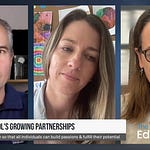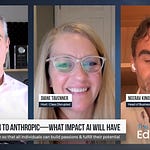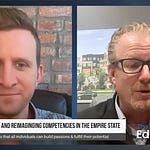Description: Michael is joined by Jon Carson of the College Guidance Network to discuss their new AI-Driven tool designed to improve postsecondary outcomes by bolstering high school guidance. The two dive into the tall task facing guidance counselors, the importance of the importance of informed decision making at the end-of-high-school transition period, and the potential of their AI chatbot, AVA, to support students, parents, and counselors.
Michael Horn:
Welcome to the Future of Education, where we are dedicated to building a world in which all individuals can build their passions, fulfill their potential, and live a life of purpose. To help us think about how we can do that better today, I'm thrilled to have Jon Carson, the founder and CEO of College Guidance Network, CGN. Full disclosure, I host shows on occasion for them on careers. I'm delighted that Jon is joining us today to talk about their work and how they're helping individuals, families, and parents better navigate the landscape of post-high school. Jon, it's great to see you. Thanks so much for joining us.
Jon Carson:
Good to be with you.
The Why Behind College Guidance Network
Michael Horn:
Let's dive in. You're a serial entrepreneur and have had many interesting ventures in your background. Let's start with the why behind this one, behind College Guidance Network. Why this company? What's its mission, and what does the work look like?
Jon Carson:
It started four years ago with my oldest. He was in the college process in high school, and there were a set of experiences I had that, as an entrepreneur, made me start to dig into how the college and career guidance system works on a large scale. I ultimately came out of that with a much better understanding of how the system fundamentally does not work in some very structural ways. Having worked in edtech for many years, as well as in content and media, it seemed to me like there was a way to solve this. At that time, AI had not yet come into the picture. Now, as AI has entered the scene, it's clear we're in a period similar to 1990-1996 when the Internet started. For us as entrepreneurs, we've come up with a design that can fundamentally change the way college and career counseling is provided in the United States at scale.
Diagnosing the Problems with Guidance in American High Schools
Michael Horn:
Super exciting to hear that. Before we get into the solution, let's diagnose the problem a little bit. In your view, there are some big structural factors that drive the challenges around guidance for high school students. I know you see it in the outcomes: student graduation rates, dropout rates of college are not that great. I think in your view, at least some of that is structural. It starts with the guidance system in place. Talk through what those major factors are in your mind that lead to the brokenness of the current system.
Jon Carson:
You almost have to start with the supply side, which is the colleges. We've got an increasingly complex process that is a bigger and bigger high-stakes financial decision. With that complexity, we have a situation where, unlike when I was graduating from high school and all escalators went up, not all escalators go up anymore. In fact, some go down and can become non-recoverable. That's the supply side. On the demand side, the issue is that you start with a high school counseling department. Those counselors typically have a union contract of about 180-185 days a year. So right away, about half of the year, they're not available. Then you have the next issue, which is the high ratios. I was unable to get a hold of my kid's counselor, and that school is at about 220 kids per counselor. Some schools have 300,400, 600 kids per counselor. It's just not possible. That is not the counselors' fault; it's a math problem. So you have a big access problem. Then you have the issue that counselors typically have their degrees in social work and are being asked to be knowledgeable across a wide range of topics. How can a counselor who talks a kid off the ledge in the morning also be an expert in how STEM careers are unfolding in the world of AI? They can't. Lastly, if you think of this whole process as a metaphor of a car and the kid is driving the car into life, they don't know how to drive the car. They may not even want to be driving the car. They're often distracted by social media. The counselor is in the back seat but in 400 back seats. I, as the parent, am in the passenger seat, wanting to be helpful but not knowing how. The counseling department doesn't have anything for the parents, who are the only other adult authority figure in the car that can reasonably have the capacity to help the kid. If you put all those things together, the system's not working. You talked about the default rates and dropout rates. Burning Glass has just released data that shows that 52% of all college graduates are underemployed after a year. We clearly do not have good decision-making at a very high-stakes point in the cycle. The system is crying for something to fix it, and you can’t do it internally because schools are not going to have the dollars to throw more counselors at the problem. You have to have something else.
Ava, the AI assistant
Michael Horn:
Super interesting to hear you break that down at all levels, frankly, in terms of how the matching problem starts and the dynamics throughout the system. One of the parts of your solution revolves around AI. You mentioned that earlier, and you've launched this AI solution. Your agent is named Ava, I believe. You're coming to market with Ava, not as a standalone AI offering but bundled with a variety of other elements. How do you think about this AI product strategy? How do you think about AI in this current solution, and how is it woven into what you are doing to solve the challenges you just described?
Jon Carson:
First, I'll just say that I may sound fairly coherent right now, but it has not always been so. When we first started out, the idea was to mimic a company called Masterclass, which had begun producing a very high-end video library around things like cooking and sports. Our idea was, what if you could create a Masterclass for college and career guidance? We began building this library of experts, but it turned out that was not the right answer because not that many people want to walk the stacks. That's like work. That was version one. Version two, the next step was putting a layer of technology on top of the library and turning the whole thing into a personalized roadmap generator for mom, dad, and the student. It was a month-by-month roadmap that included workflow management videos from top experts personalized to you and your kid. The third piece, which we are currently in the process of rolling out over the next two months, is adding the AI piece. Ava, which stands for Another Virtual Assistant, is our AI counseling assistant. Ava's distinctive characteristic is being trained by the content we have across these experts. We currently have just under 300 experts across 110 topics and just under 3000 videos. We've better understood that content equals data, and very high-quality content equals very high-quality data. That's very important in having a quality conversational assistant. If you put together a conversational counseling assistant with a personalized roadmap, personalized text and email nudges, and a year-round live programming schedule of live experts, that becomes a total solution. We think of it as guidance in a box. This allows a school to provide the capability to a family to have access to the best guidance 365 days a year, 24 hours a day. This takes an enormous load off of the counselor's plate, which is important because there's a whole teenage mental health crisis that desperately needs more counseling time. We think this can be a win for everybody.
Michael Horn:
Super interesting. If I understand you right, you're basically saying, counselors, you can lean into your expertise around social work and working individually with students who need the help. We have this breadth of content experts, 300-plus experts, and 3000 some odd videos that allow us to handle the breadth of questions any young individual might bring. My interests might be different from yours, so we have the expertise and content breadth to work with that. You're using the experts to provide the best advice for any given topic and have this knowledge graph that Ava is trained on so that I get the right piece of advice, the right direction, and the right nudge at the right time in my journey. Am I getting this right? Is this how it all comes together?
Jon Carson:
It is. I'll simplify it. We've done a ton of field research, and it doesn't really matter the socioeconomic background of the student or the family. Everybody really wants the same four things, which actually makes it easier from a design standpoint. We want to know what to do, when to do it, how to do it, and why to do it. If that can come from top experts that we can trust and that are credible, then that's the package. It's about delivering what, when, how, and why. To do that, you have to have a conversational capability. That's Ava. You have to have workflow project management. That's the personalized roadmaps. You have to have access to live experts. That's our live programming. And you have to have remind nudges because we're all so busy. There could be a window closing for the SAT registration test this summer. This whole project started because my wife and I barely made one of these within four hours. She turned to me and said, "I just want a plan." This is the plan. This is what guidance in a box would look like for someone navigating a very complex thing they've never done before.
Differentiating CGN's approach
Michael Horn:
I can hear the exasperation in her voice as you tell that story that leads to this solution. Talk to me about the limited budgets of schools, states, and the like, and how they can't just throw money and people at this problem. How does this content-centric approach coexist with some of the software solutions like Naviance or Score? I hear it a lot of times. A lot of states and schools say, "We've already got something." What's your take on how this is complementary and critical to their operations alongside what they think they have?
Jon Carson:
The best way to think about it is software versus content. The software solutions are robust aggregations of tools. There's something to build a college list, do scholarship searches, request a recommendation letter, provide your transcript, and integrate with the common app. These are software tools. The people who work at these companies are typically software engineers. Using my car metaphor, this is the steering wheel that the kid uses to drive the car from A to B. You must have that steering wheel to get from here to there. We are more like the GPS system that helps the family navigate. We are about guidance and content, not software. We do not have a robust software team. Our people come from PBS, ESPN, and Family Education Network. We think cars drive better with navigation. That's our role: to aggregate experts into a cohesive user experience that's not overwhelming, personalized, and complements the steering wheel.
Activating Parents
Michael Horn:
You just said a few interesting things that I want to key in on as we start to wrap up this conversation. You used the word "guidance." You are not the software; you are the guidance. That's a critical piece missing in the depth and breadth we need across the system right now. You have a real focus on parents. Talk about why parents and guardians are the linchpin from your perspective and why this is such an important solution for them. A lot of people think, "Naviance, right? My kid has access to it in the school. They jump on in the career office or the guidance office, put in their scores and interests, and get some lists of colleges." You are providing much more guidance and really helping parents with this. Talk about that decision and focal point.
Jon Carson:
First, we know the current system is not working. If it were, we wouldn't have these massive dropout rates, default rates, etc. Just giving someone a large toolbox is not enough. You have to give them the instructions and navigation as well. Asking a 17-year-old to make this kind of high-stakes decision with all the complexity is asking a lot. Asking them to do it by themselves leads to problems. We can't put it all on the counselors because there's a math problem there. We're running out of options, but there's a really good one: the person in the passenger seat who's going to be either writing a check or co-signing a loan for a lot of money, who's biologically wired to care about the individual in the driver's seat, and who is desperate to be helpful but just doesn't know what to do, when to do it, how to do it, and why to do it. You have to make it easy for them. They need expert access because they're on the journey as well. Parents are really a linchpin. Jeff Riley, the commissioner of education for Massachusetts, has called them the sleeping giant. They just want to be harnessed. Their anxiety levels are high because they see these issues. As we watch the effects of AI on the workforce and entry-level jobs, it will become even more complex and important that kids are thoughtful about picking their career paths. We spend a lot of time getting experts on AI because we think the future of work is really important.
Parents have to write the check, they care about their kid, and they see their kid is distracted. They want to get it right, but nobody's given them the right solution so they can become that counseling assistant at home. We talk to schools about turning all parents into an army of counseling assistants with a caseload of one or two. That's an enormous amount of capacity that can be unlocked, and you don't have to pay for it because they'll do it because they care about their kid.
CGN's Content Categories and What’s Next
Michael Horn:
That makes a ton of sense. Parents care about this, have a lot of anxiety, and probably spend a lot of time on this. You're helping them be smarter and more secure in decision-making. For parents who may tune in and listen to this, I will say there are great resources to help their kids assume more agency and develop executive function skills so they can take more ownership. There's great guidance in CGN around those topics, not just the checklist of what to do next. It's a much more comprehensive solution, right?
Jon Carson:
We think there are four content categories: college, money, careers, and family dynamics. How do you talk to a teenager who won't talk back? The kid is separating biologically, which is important. There are right and wrong ways to engage that kid. Many parents make the wrong decision by leaning in too much, causing the kid to push back. We try to give parents access to family therapists and experts on teenage phone screen addiction and other issues that get in the way of healthy exchanges between an engaged parent and their kid.
Michael Horn:
Perfect. Jon, how can folks tuning in learn more about CGN and get in touch?
Jon Carson:
Our URL is collegeguidancenetwork.com. There's an ability to request a demo or reach out to us. At the end of August, we're rolling out this combined solution with personalized roadmaps and Ava integrated into the experience. We're excited about the fall pilots we're running. The commissioner in New Hampshire has funded a pilot, and we're excited to have a scalable solution that can change the way guidance is done in American high schools.












